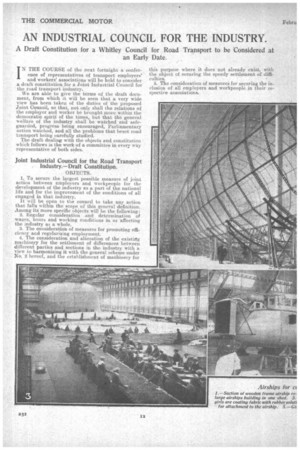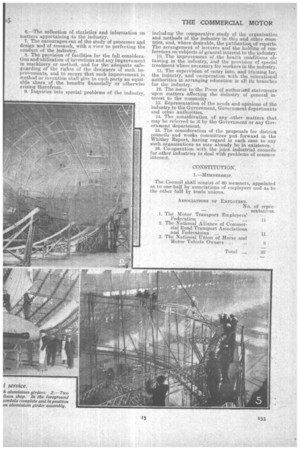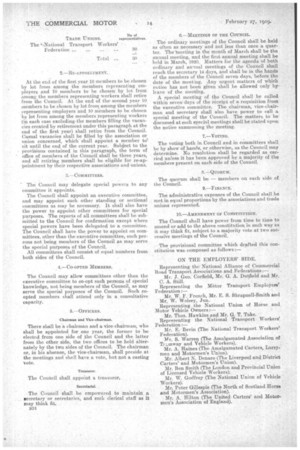AN INDUSTRIAL COUNCIL FOR THE INDUSTRY.
Page 12

Page 13

Page 14

If you've noticed an error in this article please click here to report it so we can fix it.
A Draft Constitution for a Whitley Council for Road Transport to be Considered at an Early Date.
IN THE COURSE of the next fortnight a conference of representatives of transport employers' and workers' associations will be held to consider a draft constitution for a Joint Industrial Council for
the road transport industry.. .
We are able to give the terms of the draft document, from which it will be seen that a very wide view has been taken of the duties of the proposed Joint Council, so that, not only shall the relations of the employer and worker be brought more within the democratic spirit of the times, but that the general -welfare of the industry shall be watched and safeguarded, progress being encouraged, Parliamentary action watched, and all the problems that beset road transport being carefully studied.
The draft dealing with the objects and constitution which follows is the work of a committee in every way representative of both sides.
Joint Industrial Council for the Road Transport . Industry.—Draft Constitution.
OBJECTS.
1. To secure the largest possible measure of joint action between employers and workpeople for the development of the industry as a part of the national life and for the improvement of the conditions of all engaged in that industry. It will be open to the council to take any action that falls within the scope of this general definition. Among its more specific objects will be the following: 2. Regular consideration and determination of wages, hours and working conditions in or affecting the industry as a whole. 3. The consideration of measures for promdting efficiency and regularizing employment.
4. The consideration and alteration of the existing machinery for the settlement of differences between different parties and sections M the industry with a view to harmonizing it with the general scheme under No: 2 hereof, and the establishment of machinery for
this purpose where it does not already exist, with the object of securing the speedy settlement of difficulties.
5. The consideration of measures for securing the inclusion of all employers and workpeople in their respective associations. 6.—The collection of statistics and information on matters appertaining to the industry. 7. The encouragement of the study of processes apd design and of research, with a view to perfecting the conduct of the industry. B. The provision ef facilities for the full consideration and' utilization of inventions and any improvement in machinery or method, and for the adequate safeguarding of the rights of the designers of such improvements, and to secure that such improvement in method or invention shall give to each party an equitable share of the benefits financially or otherwise arising therefrom.
9. Inquiries into special problems of the industry, including the comparative study of the organisation and methods of the industry in this and other ‘431111•. tries, and, where desirable, the publication_ot reports. The arrangement of lectures and the holdingof conferences on subjects of general interest to the industry.
10. The improvement of the health conditions obtaining in the industry, and the provision of special treatment Where necessary for workers in the industry.
11. The supervision of entry into, and training for, the industry, and co-operation with the educational authorities in arranging education in all its branches for the industry.
11 The issue to the Press of authorised statements upon matters affecting the industry -of general interest to the cornmuity.
13. Representation of the needs and opinions of the industry to the Government, Government departments and other authorities.
14. The consideration Of any ,other matters that may be referred to it by the Government or any Government department. 15. The consideration of the proposals for district councils and works committees put forward in the Whitley Report, having regard in each case to any such organisations as may already be in existence.
16. Co-operation with the joint industrial councils for other industries to deal with problems of COMMOD interest.
CONSTITUTION, 1.—MEMBERSHIP.
The Council shall consist of 60 menmers, appointed as to one-half by associations of employers and as to the other half by trade unions.
ASSOCIATIONS OF EltIFLOYkRS.
No. of repre sentatives.
1. The Motor Transport Employers' Federation ... 11 2. The National Alliance of Commercial Road Transport Associations and Federations ... 1/ 3. The National Union of Horse and
Motor 'Vehicle Owners 8 Total ... 30 The 'b-National Transport Workers' Federation 30 Total 30 S.—RE-APPOINTMENT..
At the end of the first year 10 members to be chosen by lot from among the members representing employers and 10 members to be chosen by lot from among the members representing workers shall retire from the Council. At the end of thesecond year 10 members to be chosen by lot from among the members representing employers and 10 members to be chosen by lot from among the members representing workers (in each ease excluding,the members filling the vacancies created by retirement under this paragraph at the end of the first year) shall retire from the Council. Casual vacancies shall be filled by the association or union concerned, which 'shall appoint a member to` sit until the end of the current year. Subject to the provisions contained in this paragraph, the term of office of members of the Council shall be three years, and all retiring members shall be eligible for re-appointment by their respective associations and unions.
:3.COMMITTEES.
• The Council may delegate special powers to any committee it appoints.
. The Council shall appoint an executive committee, and may appoint such other standing Or sectional committees as may be necessary. It shall also have the power to appoint other committees for special purposes. The reports of all committees shall be submitted to the Council for confirmation except where special powers have been delegated to a committee. The Council shall have the power to appoint on committees, other than the executive committee, such persons not being members of the Council as may serve the special purposes of the Council.
All committees shall consist of equal numbers from both sides of the Council.
4.-CO-OPTED MEMBERS.
The Council may allow committees other than the executive committee to co-opt such persons of special knowledge, not being members of the Council, as may serve the special purposes of the Council. Such coopted members shall attend only in a consultative capacity.
5.—OFFICERS.
Chairman and Vice-chairman.
There shall be a chairman and a-vice-chairman, who shall be appointed for one year, the former to be elected from one side of the Council and the latter from the other side, the two offices to be held alternately by the. two sides of the Council. The chairman or, in his absence, the vice-chairman, shall preside at the meetings and shall have a vote, hut not a ca-sting vote.
Treasurer.
The Council shall appoint a treasurer.
Secretarial.
The Council shall be empowered to maintain a secretary or secretaries, and such clerical staff as it may think fit.
B34 6.—MEETINGS OF THE COUNCIL The ordinary meetings of the Council shall be held as often as necessary and net less than once a quarter. The-meeting in the month of March shall be the annual meeting, and the first annual meeting shall be held in March, 1920. Matters for the agenda of both ordinary and annual meetings of the Council shall reach the secretary 14 days,'and shall be in the hands of the members of the Council seven days, before the date of the meeting. Any urgent matters of which notice has not been given shall be allowed only by kave of the meeting.
A special meeting of the Council shall be called within seven days of the receipt of a requisition from the executive committee. The chairman, vice-chairman and secretary shall also have power to call a special meeting of the Council. The matters to be discussed at such special meetings shall be stated upon the notice summoning the meeting.
7.—Ver The voting both in Council and in committees shall. be by show of hands, or otherwise, as the Council may determine. No resolution shall be regarded as carried unless it has been approved by a majority of the members present on. each side of the Council.
8. —QuoRum.
The quorum shall be — members on each side of the Council.
9.—FINANCE.
The administrative expenses of the Council shall be met in equal proportions by the associations and -trade unions represented.
W.—AMENDMENT OF CONSTITUTION.
The Council shall have power from time to time to amend or add to the above constitution in such way as it may think fit, subject to a majority vote at two suc cessive meetings of the Council. • The provisional committee which drafted this constitution was composed as follows : ON THE EMPLOYERS' SIDE.
Representing the National Alliance of Commercial Road Transport Associations and Federations— Mr. J. Geo.' Corfielel, Mr. G. A. Dut,field and Mr. C. A. Still.
Representing the Motor Transport EmploYere Federation:— Mr. W. F. French, Mr. E. S. Shrapnell-Smith and Mr. W. Wolsey, Jun.
Representing the National Union of Horse and Motor Vehicle Owners:— Mr. Thos. Hawkins and Mr. G. T. Tuke.
Representing the National Transport Workers' Federation :— Mr. E, Bevin (The National Transport Workers' Federation). IVIr. S. Warren (The Amalgamated Association of Tramway and Vehicle Workers).
Mr. A. Haines (The Amalgamated Carters, Lurrymen and Motormen's Union).
Mr. Albert N. Denaro (The Liverpool and District Carters' and Motormen's Union).
Mr. Ben Smith (The London and Provincial Union of Licensed Vehicle Workers).
Mr. W. Godfrey (The National Union of Vehicle Workers).
Mr. Peter Gillespie (The North of Scotland Horse and Motormen's Association).
Mr. A. Hilton (The United Carters' and Motormen's Association of England).






















